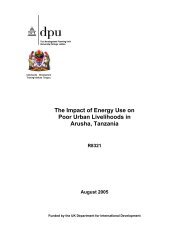EPA Review Annex Documents - DFID
EPA Review Annex Documents - DFID
EPA Review Annex Documents - DFID
Create successful ePaper yourself
Turn your PDF publications into a flip-book with our unique Google optimized e-Paper software.
In terms of coverage, there are a wide range of exclusions. Since one of the partners (the<br />
EU) made an almost complete liberalisation of their imports and given the size of its trade, a<br />
“substantial” liberalisation of the bilateral trade could be achieved with a lower coverage from<br />
its partners. It is clear that this is the approach followed for these agreements. If the share of<br />
imports excluded in each agreement is taken into consideration, except the Ghana interim<br />
<strong>EPA</strong>, they all fall below the 20% threshold. On the other extreme, Seychelles has a little<br />
share of exclusions in terms of volume of trade.<br />
If we consider the quantity of lines excluded, Mozambique has excluded 60.2% of their tariff<br />
lines that represents 18.5% of their trade. This implies a heavy protection in a substantial<br />
number of sectors. On the other hand, Comoros, has only excluded 1.7% of their tariff lines<br />
that represent 19.3% of their trade.<br />
Another interesting feature to analyse is the schedule per se. Even if an agreement could<br />
have a long period of implementation, the existence of down payments (immediate<br />
liberalisation) plus trade that is liberalised in the first stages of the implementation indicates<br />
an important effort from the conceding part. For example, Cote d’Ivoire will have by 2013,<br />
three years after the start of the implementation, more than 50% of their imports liberalised,<br />
where only 5.7% of it was liberalised before the start of the agreement. As a consequence,<br />
Cote d’Ivoire could have received a longer implementation period given the importance<br />
liberalisation that will make in the first years of the schedule.<br />
However, the schedule for EAC reveals the opposite. EAC has more years to make<br />
complete the implementation of the agreement but their initial effort is practically zero, given<br />
that 65.4% of their trade is liberalised already. This implies that, a part of the exclusions,<br />
EAC will have around 20 years to liberalise less than 15% of their trade.<br />
More balanced schedules seem to be those within to CARIFORUM and Fiji. A combination<br />
of down payments of 24% in Fiji and a 61% of the trade liberalised in the first ten years in<br />
CARIFORUM, generates a smoother transition to liberalisation.<br />
Therefore, it could have been possible to adopt a flexible interpretation of the Article XXIV by<br />
allowing longer implementation periods to those countries that were willing to make a more<br />
important liberalisation effort at the beginning. Alternatively, countries willing to accept a<br />
shorter implementation period with important liberalisation commitments at the beginning,<br />
could have presented a wider list of exclusions.<br />
The development dimension must not be lost and despite the fact that a quicker and<br />
extensive liberalisation is desirable, it is clear that ACP countries need an SDT in terms of<br />
the length and coverage of the implementation period of the agreement. Not only in terms of<br />
protection of their infant industries but also in terms of the fiscal effects. Therefore, a double<br />
approach of coverage based on the quantity of tariff lines and the share of imports from the<br />
EU could have been devised.<br />
On the other hand, countries that had already initiated an unilateral liberalisation process or<br />
in which a significant part of their trade was already liberalised before the start of the<br />
implementation of the agreement, could have received an special treatment with a longer<br />
implementation period for the rest of their sectors with little liberalisation at the beginning.<br />
2. The Most Favourable Nation Clause in the context of <strong>EPA</strong>s<br />
In principle the Most Favourable Nation (MFN) Clause means that after the signing of an<br />
agreement, if any part of the agreement negotiates another agreement with a third party, any<br />
concession made to that third party that has been not made in the first agreement, must be<br />
201
















